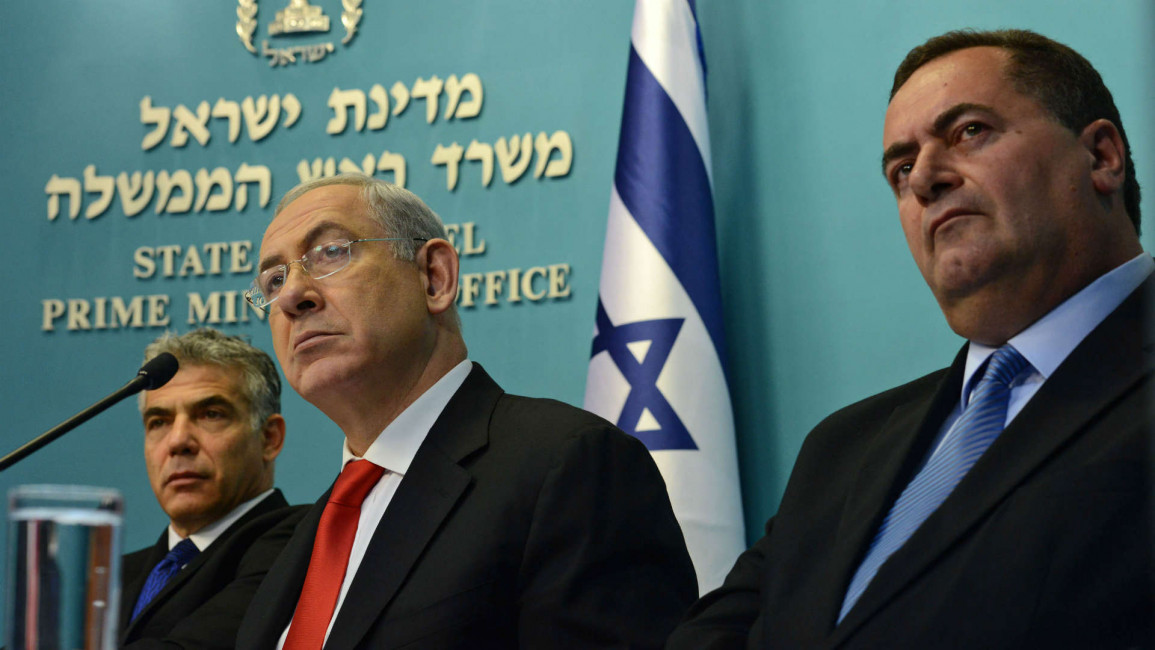Israel to 'officially recognise' Armenian genocide following Turkey spat
Israel to 'officially recognise' Armenian genocide following Turkey spat
Israeli MPs could officially recognise the 1915 Armenian genocide by Turkey, in a bid to avenge Ankara amid an escalating diplomatic row.
2 min read
Yisrael Katz (right) is one of several MKs to support the move [Getty]
In the latest escalation of tit-for-tat diplomatic battele between Israel and Turkey, members of Jerusalem's Knesset have proposed to officially recognise the killing of over a million Aremenians by Ottoman Turkey more than a century ago as an act of genocide.
Israel's foreign ministry has blocked previous attempts to recognise the Armenia genocide, due to its fragile diplomatic ties with Turkey.
Ankara vehemently denies that the events during the First World War constituted a genocide.
Israel and Turkey ally Azerbaijan have played down the massacres.
Israel's latest move in what observers are calling "political chess" between the two adversaries.
This could include calling out Turkey's killings of its Kurdish minority and its occupation of northern Cyprus.
Turkey President Recep Tayyip Erdogan has responded to Monday's massacre of 61 Palestinians in Gaza, by saying Israel is carrying a "genocide" in Gaza.
This has led to a hostile diplomatic row between Israel and Turkey.
Turkey recalled its envoy in Israel and expelled Israeli diplomats from Istanbul and Ankara.
Turkish media were invited to film Israeli Ambassador Eitan Naeh being subjected to prolonged security controls by at Istanbul airport as he was forced to leave the country.
Turkey's President Erdogan and Israel's Prime Minister Binyamin Netanyahu also exchanged a very public war-of-words on Twitter on Monday.
Netanyahu responded by calling Erdogan one of Hamas' biggest supporters, saying, "there is no doubt that he well understands terrorism and slaughter".
Turkey, to this day, strongly denies that the killings amounted to a genocide.
Only 29 countries recognise the events of 1915-1917 as a genocide. These include Brazil, Canada, France, Germany, Italy and Russia, as well as 48 states out of 50 of the United States.
Israel's foreign ministry has blocked previous attempts to recognise the Armenia genocide, due to its fragile diplomatic ties with Turkey.
Ankara vehemently denies that the events during the First World War constituted a genocide.
Israel and Turkey ally Azerbaijan have played down the massacres.
Israel's latest move in what observers are calling "political chess" between the two adversaries.
This could include calling out Turkey's killings of its Kurdish minority and its occupation of northern Cyprus.
Turkey President Recep Tayyip Erdogan has responded to Monday's massacre of 61 Palestinians in Gaza, by saying Israel is carrying a "genocide" in Gaza.
This has led to a hostile diplomatic row between Israel and Turkey.
Turkey recalled its envoy in Israel and expelled Israeli diplomats from Istanbul and Ankara.
Turkish media were invited to film Israeli Ambassador Eitan Naeh being subjected to prolonged security controls by at Istanbul airport as he was forced to leave the country.
Turkey's President Erdogan and Israel's Prime Minister Binyamin Netanyahu also exchanged a very public war-of-words on Twitter on Monday.
Twitter Post
|
Netanyahu responded by calling Erdogan one of Hamas' biggest supporters, saying, "there is no doubt that he well understands terrorism and slaughter".
Israel's Minister of Intelligence Yisrael Katz was among the Israeli MPs who called for support of the new Armenian genocide recognition bill.
Katz slammed the Turkish leader for his "extreme" reaction to Gaza's massacre.
"Every time something happens in Gaza, he gets worked up and acts in a very extreme manner," Katz said.
"This is a man who slaughters the Kurdish minority in Turkey and now in Syria," he added during an interview with Israel's Y-Net News.
"He took 140,000 Kurds and transferred them from the region to replace them with other residents. The man acts cruelly and then preaches to us."
Armenian activists and hisorians say that Ottoman authorities systematically killed around 1.5 million Armenians between the years 1915 and 1918.
Anti-Armenian sentiments had been rife for years under Ottoman rule, and Armenian communities suffered decades of oppression and persecution under the Turks.
Anti-Armenian sentiments had been rife for years under Ottoman rule, and Armenian communities suffered decades of oppression and persecution under the Turks.
Turkey, to this day, strongly denies that the killings amounted to a genocide.
Only 29 countries recognise the events of 1915-1917 as a genocide. These include Brazil, Canada, France, Germany, Italy and Russia, as well as 48 states out of 50 of the United States.


![Minnesota Tim Walz is working to court Muslim voters. [Getty]](/sites/default/files/styles/image_684x385/public/2169747529.jpeg?h=a5f2f23a&itok=b63Wif2V)




![Debris near Rafic Hariri International Airport [Getty]](/sites/default/files/styles/image_330x185/public/2176162423.jpeg?h=a5f2f23a&itok=MCSK9mkM)
![An Israeli air strike on Jabalia killed teenage journalist Hassan Hamad [Screengrab/X]](/sites/default/files/styles/image_330x185/public/2024-10/hassan%20hamad1.jpg?h=c12e0b96&itok=Rd_dyCVp)
